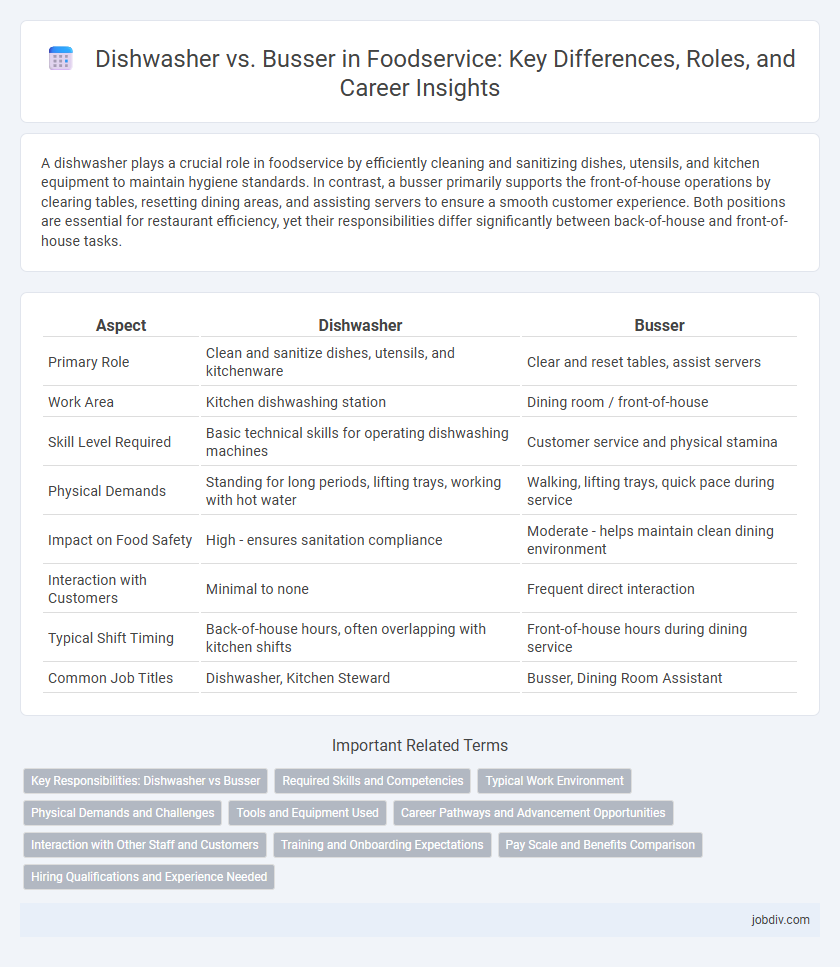A dishwasher plays a crucial role in foodservice by efficiently cleaning and sanitizing dishes, utensils, and kitchen equipment to maintain hygiene standards. In contrast, a busser primarily supports the front-of-house operations by clearing tables, resetting dining areas, and assisting servers to ensure a smooth customer experience. Both positions are essential for restaurant efficiency, yet their responsibilities differ significantly between back-of-house and front-of-house tasks.
Table of Comparison
| Aspect | Dishwasher | Busser |
|---|---|---|
| Primary Role | Clean and sanitize dishes, utensils, and kitchenware | Clear and reset tables, assist servers |
| Work Area | Kitchen dishwashing station | Dining room / front-of-house |
| Skill Level Required | Basic technical skills for operating dishwashing machines | Customer service and physical stamina |
| Physical Demands | Standing for long periods, lifting trays, working with hot water | Walking, lifting trays, quick pace during service |
| Impact on Food Safety | High - ensures sanitation compliance | Moderate - helps maintain clean dining environment |
| Interaction with Customers | Minimal to none | Frequent direct interaction |
| Typical Shift Timing | Back-of-house hours, often overlapping with kitchen shifts | Front-of-house hours during dining service |
| Common Job Titles | Dishwasher, Kitchen Steward | Busser, Dining Room Assistant |
Key Responsibilities: Dishwasher vs Busser
Dishwashers primarily focus on cleaning and sanitizing dishes, utensils, and kitchen equipment to ensure a hygienic environment in foodservice operations. Bussers assist servers by clearing tables, resetting dining areas, and supporting overall front-of-house efficiency to enhance customer experience. Both roles are essential for maintaining smooth workflow, but dishwashers work mainly in the kitchen, while bussers operate in the dining area.
Required Skills and Competencies
Dishwashers require strong attention to detail, time management, and the ability to handle repetitive tasks efficiently to maintain kitchen hygiene and equipment functionality. Bussers need excellent communication skills, physical stamina, and the ability to anticipate server and customer needs to ensure timely table turnover and a smooth dining experience. Both roles demand teamwork, reliability, and adherence to health and safety standards in a fast-paced foodservice environment.
Typical Work Environment
Dishwashers typically work in kitchen areas with high humidity, heat, and constant exposure to water and cleaning chemicals, often standing for long hours. Bussers operate mainly in dining rooms, moving swiftly between tables to clear dishes and reset seating, requiring agility in fast-paced, crowded environments. Both roles demand physical stamina but vary significantly in noise levels and exposure to direct customer interaction.
Physical Demands and Challenges
Dishwashers face intense physical demands including repetitive lifting of heavy trays and constant exposure to hot water and harsh cleaning chemicals, causing strain on their hands and back. Bussers endure continuous physical activity through prolonged periods of walking, bending, and carrying trays and dishes, requiring stamina and agility in a fast-paced environment. Both roles demand endurance and strength, but dishwashers often confront harsher conditions due to heat and moisture exposure.
Tools and Equipment Used
Dishwashers utilize commercial-grade machines such as conveyor, door-type, and undercounter dishwashers to efficiently clean large volumes of dishes, pots, and utensils. Bussers rely on trays, bussing carts, and trays for clearing and transporting dirty tableware, along with cloths and spray bottles for quick spot cleaning and resetting tables. Both roles are essential for maintaining hygiene and smooth operations in foodservice environments.
Career Pathways and Advancement Opportunities
Dishwashers typically begin their careers handling cleaning and sanitation tasks, providing a foundational understanding of kitchen operations that can lead to roles such as kitchen assistant or prep cook. Bussers gain experience in dining room service and customer interaction, which can advance into server or food runner positions, enhancing front-of-house skills. Career progression in foodservice benefits from cross-training, with both roles offering opportunities to develop management skills and transition into supervisory or restaurant management positions.
Interaction with Other Staff and Customers
Dishwashers primarily interact with kitchen staff, ensuring clean dishes and utensils are ready for servers and cooks, which supports efficient foodservice operations. Bussers engage directly with servers and customers by clearing tables and resetting dining areas, facilitating smooth front-of-house flow and enhancing guest experience. Effective communication between dishwashers and bussers is essential to maintain timely table turnover and seamless coordination between kitchen and dining room staff.
Training and Onboarding Expectations
Dishwasher training emphasizes safety protocols, chemical handling, and efficient cleaning techniques to ensure sanitation standards in foodservice environments. Busser onboarding focuses on customer service skills, table maintenance, and swift clearing processes to enhance guest experience and operational flow. Clear role-specific training accelerates proficiency and supports a cohesive team dynamic in busy restaurant settings.
Pay Scale and Benefits Comparison
Dishwashers typically earn an hourly wage ranging from $10 to $15, while bussers earn slightly higher, around $12 to $18 per hour, reflecting their more direct customer interaction. Bussers often receive additional tips, boosting their total earnings beyond base pay, whereas dishwashers usually rely solely on hourly wages. Benefits such as health insurance and paid time off are more common for bussers employed full-time, while dishwashers in part-time roles may have limited access to these benefits.
Hiring Qualifications and Experience Needed
Dishwasher positions typically require minimal prior experience, focusing on reliability, attention to detail, and the ability to handle repetitive tasks efficiently. Bussers often need strong customer service skills, the ability to clear and reset tables quickly, and prior experience in a fast-paced foodservice environment is preferred. Both roles demand physical stamina and teamwork, but bussers usually require more interpersonal skills and a basic understanding of restaurant operations.
Dishwasher vs Busser Infographic

 jobdiv.com
jobdiv.com